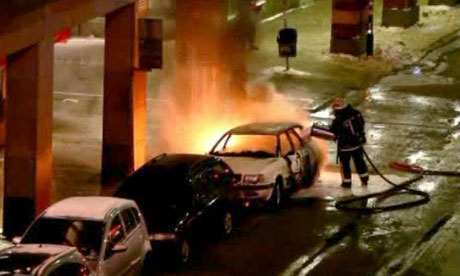Terrorism Weekly: What the Attack in Sweden Really Tells Us
 Thankfully, last weekend's attack in Stockholm killed only the bomber, Taimour Abdulwahab Al-Abdaly. But, strangely, the event triggered gnashing of teeth and attribution of blame on an epic scale.
Thankfully, last weekend's attack in Stockholm killed only the bomber, Taimour Abdulwahab Al-Abdaly. But, strangely, the event triggered gnashing of teeth and attribution of blame on an epic scale.
Some of the usual suspects chimed in, pursuing their various agendas. In the Daily Mail,, Melanie Phillips plugged her book Londonistan and noted that the failed attack was further evidence of her revelation: the Islamisation of Britain continues unabated thanks to the liberal elite’s embrace of multiculturalism. Apparently, according to Phillips, there is a connection between a growing number of schools serving Halal food and a lone individual blowing himself up in Sweden.
The attack also allowed columnist Nick Cohen to jump in and target those on the left who link terrorism to Western foreign policy, including the invasion of Iraq which Cohen favoured. Despite a statement from the attacker connecting his mission in part to the presence of Swedish troops in Afghanistan, Cohen knew that foreign policy had nothing to do with the bombing. Instead, it was triggered by the intolerance of some within Islam to western values. (The idea that there may have been multiple causes, as the bomber himself suggested, escaped Cohen's attention.)
Next on the scene was Andy Hayman, former head of counter-terrorism for the London Metropolitan Police. The blame should be on the Prevent programme, a government effort to deradicalize violent extremists, and also on the “Muslim community” which failed to provide intelligence about the individual, even though a mosque in Luton apparently kicked out the bomber because of his extremist views. Hayman, who in the past has defended “stop and search” powers despite an absolute zero of evidence that they protect against terrorism, suggested --- perhaps not surprisingly --- that more money go to the police.Other pundits in British media decided that UK universities must have something to do with the attack, since Al-Abdaly had graduated in 2004 with a sports therapy degree.
All blame aside, what does the attack on the weekend tell us about the threat of international terrorism? First, the threat of lone individuals or small groups remains high but, in turn, that small number of participants is more likely to bring failed attacks and a low number of casualties even if the attack succeeds. The lack of skill of the terrorist also points to either an absence of training, hurried training, or poor training.
The car bomb used in Stockholm seems remarkably similar to the one used in the failed effort outside a London nightclub in June 2007 by the individuals who would later launch a bungled assault on Glasgow Airport. It also appears to be similar to the failed vehicular bomb left in Times Square in New York.
The homemade nature of these weapons speaks to efforts to avoid the detection that would be triggered by the purchase of fertilizer, which would yield a much more powerful explosion. Al-Qaeda has called for more of these attacks because they believe these have a greater potential for success not only because they are more difficult to detect but possibly because some form of attack is needed to aid propaganda and recruitment. Apparent impotence in the face of Western countermeasures, including drone attacks, does not equate to an image of a dynamic organisation.
The other significant pointer in the Swedish attack is that it is extremely difficult to detect such individuals. This is where this typical British gnashing of teeth and assigning of blame descends into the realm of the ridiculous. Britain's domestic intelligence service MI5 long ago concluded, based on detailed case studies, that there is no clear terrorist profile from which one can determine who will become a terrorist and who won’t. There is no evidence, for example, that those who commit this type of terrorism are more religiously devout. In fact, the evidence tends to point to devotion offering protection against a slide into violent extremism.
The answer as to why someone would choose to kill others and in the process himself is complex and not easily found in a single variable. In the rush to blame after Stockholm, no one has commented on the Swedish angle to the attack. Al-Abdaly's formative years were spent in Sweden. Despite having lived in the UK for a number of years and despite British involvement in Afghanistan, he chose to travel to Sweden to kill himself. Why?
Time might shed insight into this crucial angle, but measured reflection is not a speciality of the UK chattering classes.

 Friday, December 17, 2010 at 7:17
Friday, December 17, 2010 at 7:17
Reader Comments